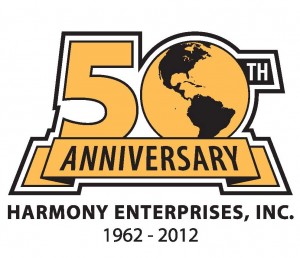The history of Harmony Enterprises, Inc., locally known as HECO, begins when they were founded in 1962 by several local businessmen who had a vision to diversify the local economy. They invested $300 each and started operations in the basement of the local newspaper office in Harmony, Minnesota. The purpose of the corporation was to establish an industry in the local community that relied heavily on its agricultural economic base. After incorporation, shares of stock were sold at $100 each to local population.
History of Harmony Enterprises
On March 12, 1962 Wally Piehn, George Frogner, Archie Halvorson, Carl Lind and Merlin Hoiness held the first Board of Directors meeting. Wally Piehn was elected as the First President. At this meeting, Merlin Hoiness also demonstrated a model of a portable shelter that could be used as a fishing shelter or beach cabana.
In October of 1962 a special directors meeting was held. At this meeting Merlin Hoiness and Bill Peterson demonstrated another version of a portable shelter frame. The directors hired Bill Peterson to prepare a working model of the shelter.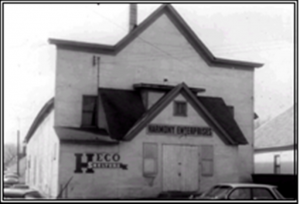
A community meeting was held in January 1963, in Harmony. The people attending subscribed a total of $1000 in stock at a par value of $100 per share. A salesman was hired.
Merlin Hoiness was elected President on March 12, 1963, and would serve in this position until April 1965.
In late August 1963, the Board discussed purchasing a building to start manufacturing. Instead, the Board decided to rent the old Opera House, now the Legion Club, until they were in a better financial position to build a facility. It was also decide to hire a manager and to register the trade name HECO. Al Cremer was hired as manager.
By late March of 1964, a sales manager and five factory representatives were hired to cover the Midwest and sales territory east of Chicago. The only products being marketed were the portable ice fishing shelters and the rather unique Bikini Walking Cane, which could be converted into a folding seat.
By this time, the rented manufacturing facility was becoming crowded. Plans were made for construction of a new building on the north end of Harmony. In April 1964, a group of business people organized the Harmony Development Corporation. Its purpose was to borrow funds from the Small Business Administration, with the Harmony State Bank participating. The funds were used to buy the land and erect a new building, which was sold to HECO on a twenty year land contract.
By July of 1964, the Board realized that the company could not support itself by manufacturing ice fishing shelters alone. The product was too seasonal and the marketing area limited. Other products were tried with limited success.
In January 1965, HECO made the first prototype canvas tent and roof lifting mechanism for a new style recreational vehicle called a “hard top fold down camping trailer”. The canvas and roof lift mechanism was displayed on a camper manufactured by Travel Equipment Corp., at a RV trade show at Cobo Hall in Detroit.
Other camper manufacturers were impressed by the quality of HECO’s products. HECO received an order for 10 canvases. And by February the company had orders for 680 canvases and 520 sets of roof lift systems. This was the turning point for HECO!
In April of 1965, Al Cremer replaced Merlin Hoiness as President.
In March 1968, Bill Peterson was elected Vice President, and also served as Chief Design Engineer until his retirement in 1988.
As the Company evolved, it became more involved in manufacturing canvas tents and roof lifting 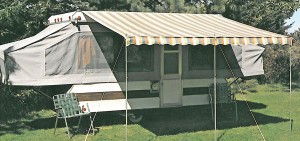 mechanisms, awnings, and add-a-rooms for the fold-down camper industry. From 1965 through 1969, the Company grew rapidly. Two additional buildings and a warehouse were constructed by the Harmony Development Corporation and sold to HECO on a land contract.
mechanisms, awnings, and add-a-rooms for the fold-down camper industry. From 1965 through 1969, the Company grew rapidly. Two additional buildings and a warehouse were constructed by the Harmony Development Corporation and sold to HECO on a land contract.
Don Cremer began his career with HECO in July of 1968 as Assistant Manager. Don was named General Manager in 1969. Following the death of his father (Al) in 1978, Don was promoted to President.
By 1969 HECO saw the need to diversify. The RV business was good, but very seasonal. Employment would fluctuate from as many as 300 employees, on a three shift basis, during the peak season, to less than fifty during the slow season.
In 1969, they purchased General Polyflex Corporation, in Warren, Michigan (near Detroit). The company name was later changed to General Polyflex, Inc. (GPI). The new company manufactured polyurethane foam carpet padding. The following year the economy in the Warren/Detroit area took a severe downturn. For that reason, along with the difficulty in managing the company, it was decided to discontinue the operation.
The gasoline shortages in the early 1970‘s had a negative impact on the recreational vehicle industry. This in turn affected HECO’s sales.
In 1971, another attempt was made to diversify. A small company in Minneapolis was working with the Red Owl supermarket chain, to develop a baler for baling used cardboard boxes. Up until that time, the boxes were burned in an incinerator, which was harmful to the environment. The company that was developing the hydraulic operated baler was looking for someone to do the manufacturing. Harmony Enterprises recognized the future need for equipment to help protect the environment and agreed to manufacture the baler.
In 1972, they began manufacturing hydraulic balers under the GPI name, to meet the growing 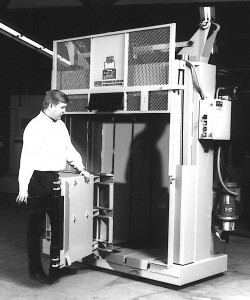 demand for retail, industrial and commercial businesses to handle and recycle corrugated cardboard. The demand for balers grew, becoming a more popular method of handling cardboard than the previous method of incineration, which was declining due to environmental impact and legislative changes. Balers are also utilized for baling aluminum cans, plastic containers and other recyclable materials. GPI’s quality was immediately recognized, and the balers became a more central focus for the business and demand grew at a steady pace.
demand for retail, industrial and commercial businesses to handle and recycle corrugated cardboard. The demand for balers grew, becoming a more popular method of handling cardboard than the previous method of incineration, which was declining due to environmental impact and legislative changes. Balers are also utilized for baling aluminum cans, plastic containers and other recyclable materials. GPI’s quality was immediately recognized, and the balers became a more central focus for the business and demand grew at a steady pace.
In 1987, the company added a new product line of stationary compactors to augment its line of equipment. The stationary compactors are designed to compact waste materials, reduce hauling costs and relieve landfill problems for municipalities and counties.
Increased product demand and the development of new models, created pressure on the manufacturing facility. Therefore, in 1988 the Company began an expansion program. First, a singular roof was constructed over two existing buildings (Bldg. #’s 2 & 3) to add an additional 1000 square feet of storage space. The next part of the expansion was the erection of a 14,000 square foot building to increase the production area. Existing offices were also remodeled and expanded.
In April 1988, Steve Cremer, grandson of Al Cremer, was hired as Chief Financial Officer of the Company. Steve had previously been employed by a petroleum company in Houston, TX.
In January of 1990, Steve Cremer was named as President and Don Cremer became CEO. Both gentlemen continued to serve in these respective positions until 2004.
In 1993, GPI again reinforced its market leadership by offering the Indoor Power Packer. This unique machine, constructed primarily of stainless steel, allows customers to compact and better manage their waste and recyclable materials at the source of the problem. This meant that food service industries, hospitals, and hotels could compact their waste in the kitchen or other key areas, saving customers labor and time, making the compactor a key component of the business.
In 1995, Harmony Enterprises, Inc. consolidated its business focus and sold the canvas sewing operation. The baler and compactor division was thriving, and was still very active in the roof lift system for the RV industry. The Company went through the largest renovation in the Company’s history, and invested in new plant equipment, new offices and additional production area. Sales of the GPI products were global, with units in over 25 countries worldwide.
The Company introduced the Smart-Pack, in 1998. This machine is an automatic compacting 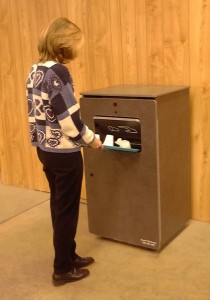 receptacle, which replaces the traditional waste bin in dining areas of fast food restaurants. The Smart-Pack features a “Smart Door”, which allows for a real no-touch opening of the waste deposit door. Also, the Smart-Pack “talks” to restaurant patrons using a Promotional Programming System. This system allows the restaurant to advertise menu items or entertain patrons with messages that play from the Smart-Pack. These units are being sold to Taco Bells, McDonalds, shopping malls, and other quick food service establishments.
receptacle, which replaces the traditional waste bin in dining areas of fast food restaurants. The Smart-Pack features a “Smart Door”, which allows for a real no-touch opening of the waste deposit door. Also, the Smart-Pack “talks” to restaurant patrons using a Promotional Programming System. This system allows the restaurant to advertise menu items or entertain patrons with messages that play from the Smart-Pack. These units are being sold to Taco Bells, McDonalds, shopping malls, and other quick food service establishments.
Harmony Enterprises went through a major transformation in 1998. The baler and compactor products began to be marketed under the Harmony Enterprises, Inc. name. The GPI division name was discontinued. Also, up until 1998, balers and compactors were sold to dealers and distributors worldwide. The company started to sell direct to the end user, which lowered costs and helped to get the company’s name out there. The internet was a large help in this transformation as the Harmony Enterprises “brand name” was growing.
Don Cremer, CEO, retired in 2004, after 37 years with the company.
Also in 2004, the company hired a national sales manager to help increase its sales force. Since then, 80% of sales are direct to the end user and Harmony Enterprises is known as a, “solution provider instead of an equipment manufacturer”.
The company developed its first horizontal baler in 2005. This HBCB05 was designed for the bottling industry. The baler removes liquids from cans and bottles, and bales the material into marketable size bales to maximize the value of the recyclable material.
By 2010, sales in the Heco division consisted of less than 2% of the company’s revenue. On December 1, 2010, the roof lift system business was sold to Camper and Recreation in Loyal, WI.
In 2011, several additional large horizontal balers have been added to our product line. These balers can be used in bottling plants, distribution centers, scrap yards and recycling centers.
Today, nearly 70% of sales are domestic while the rest are international. Some of the major corporations Harmony Enterprises sells to include; Albertsons, Safeway, Walgreen’s, Best Buy, Buffalo Wild Wings, McDonalds, Taco Bell, small privately-owned companies, and other large public or government corporations.
Balers comprise the majority of sales with 65% while compactors make up 15%. The remaining 20% of sales consist of mostly parts sold to other companies or existing customers.
Internationally, Harmony Enterprises is becoming very well known in the world of municipal solid waste solutions. The first international sale came in 1989 when Mr. Cremer received a fax from a company in Taiwan who wanted to order a baler. With some help from the Minnesota Trade Office, the sale was a success and the customer is still buying products from Harmony. Presently, 30% of the company’s revenue is from internationals sales in 70 countries.
In April 2011, the company acquired a company in France to broaden international sales. Cypress Environnement, located in Toulouse France is a sales and technical support organization selling equipment and providing servicing to the French market. Mr. Jean-Marie Rosenzweig founded the company in 1997. Cypress has sold over 1,000 balers in France since 1997. The staff consists of eight people.
This acquisition is the first company in the new Harmony Europe division of Harmony Enterprises, Inc. Harmony Europe will now have a direct sales force in the European market. In addition, Harmony Europe will be able to provide technical support to our European customers in the same time zone.
The current facility features over 95,200 square feet of production space, and we continue to add new products to the existing line. Harmony Enterprises is staffed with a tremendously talented and loyal workforce, and is one of the largest employers in the area. The Company has invested heavily in the future, to position its self for continued long-term growth.
All summer long, the staff at Harmony Enterprises has been celebrating, with a float in the Harmony parade, and employee golf picnic, and more. Today, August 29th, 2012, we are celebrating Harmony Enterprise’s 50th anniversary at our Harmony, MN, USA location with an Open House from 3-6pm. We look forward to serving the needs of our customers, while enriching the lives of our employees and local community for years to come.
